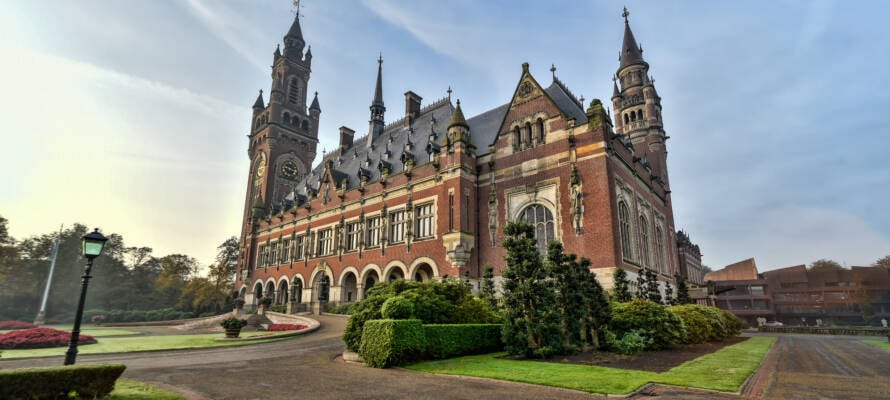‘The judgment that’s going to come from the court is politics, not law, and it’s politics from a body that is already biased against the Jewish state.’
By David Issac, JNS
While legal observers tell JNS that the Genocide case brought against Israel is a travesty, they split on whether Israel should defend itself at the hearings in The Hague.
The hearings at the International Court of Justice (ICJ), or “World Court,” start on Thursday with South Africa presenting its oral argument. Israel will present on Friday.
The hearings will focus on South Africa’s request for “provisional measures” to be brought against Israel, meaning an emergency suspension of Israel’s war against Hamas, while the court decides whether Israel has violated its obligations under the Convention on the Prevention and Punishment of the Crime of Genocide (or “Genocide Convention”).
Both countries are signatories to the convention.
Brooke Goldstein, founder and executive director of The Lawfare Project, told JNS that “the whole thing is a farce. It’s a kangaroo court.
“I think it’s a waste of time. Israel should not legitimize the court,” she said. “What on earth would Israel gain? Israel has to answer to nobody, especially not to a court that has proven itself to be a sham. This court is illegitimate.”
Goldstein pointed to the ICJ’s 2004 advisory opinion that Israel’s Judea and Samaria security barrier violated international law for infringing on Palestinian rights.
Israel began construction on the barrier in 2002 to block terrorists from entering Israel during the Second Intifada, a period of heightened Arab terrorism.
“The court didn’t allow any evidence to be considered about the fact—the very relevant fact—that the fence contributed to a sharp decline in the loss of human lives. It does not even recognize the right to self-defense,” she noted.
“Their rulings have literally no effect other than to contribute to lawfare tactics against democracies that fight against terror,” Goldstein said.
“The Jewish people have to answer to nobody when they engage in self-defense. The world has stood by and watched us being slaughtered for too long,” she added.
Avi Bell, a law professor at the University of San Diego and at Bar-Ilan University in Ramat Gan, agreed that the case is “preposterous …, a moral outrage.”
“It’s like a Nazi ally during World War II filing a legal proceeding against the United States for committing genocide against the Germans. It’s a complete inversion,” Bell told JNS.
However, “my instinct is to go and appear in the court,” Bell said. While noncooperation is sometimes an effective strategy, in this instance, going to the proceedings is a “better opportunity for Israel to neutralize Hamas propaganda.”
PR, not law
Acknowledging that the danger of participation is that it grants legitimacy, he said that it’s not always the case. For Bell, the issue is not whether to go to the court so much as the clarity of purpose in doing so.
“Our mission here is PR, it’s not law,” he said, adding that a report that Israel’s Foreign Ministry sent a message to Israeli missions worldwide asking them to convince their countries to publicly denounce the ICJ case suggests Israel is working along the right lines.
Bell’s argument is that participating gives Israel a platform, “a reasonable opportunity” to refute South Africa’s arguments not in the court at The Hague, but in the court of world opinion.
Bell isn’t very optimistic about the outcome of the case. “The judgment that’s going to come from the court is politics, not law, and it’s politics from a body that is already biased against the Jewish state. It, therefore, seems to me quite likely to accept the morally obscene arguments of South Africa,” he said.
Ziv Bohrer, senior lecturer for international law at the Bar-Ilan University Faculty of Law and a researcher at the Begin-Sadat Center for Strategic Studies, said that “from a moral perspective, [the accusation] is detestable. It falsely accuses the Jewish people of genocide.”
Nevertheless, the case has serious implications and Israel must be there in court to defend itself, he said. For one thing, the court will issue a ruling and not an advisory opinion as it did in the security barrier case. The ruling will be binding.
There are three main ways a country can find itself bound by a ruling of the ICJ. One is when disputes regarding a specific convention are referred to the court.
“The Genocide Convention states that any disputes between signatory countries regarding the fulfillment of the treaty can be adjudicated in the ICJ, meaning any member state can sue any other member state claiming that it has violated its commitment according to that convention. That is the situation now,” Bohrer said.
While the ICJ has no enforcement mechanisms and its rulings have been ignored in the past, including by the United States, in Israel’s situation there’s the matter of the ongoing lawfare against it.
“The ICJ ruling in and of itself can be potentially very harmful, but when you look at it in the context of other things that are advancing as well, the risk is greater,” Bohrer said.
He listed the war crimes investigation at the International Criminal Court (not to be confused with the ICJ), and an earlier ICJ case looking into the “legal consequences” of Israel’s supposed “ongoing violation” of “the right of the Palestinian people to self-determination.”
“All those things together are maneuvers that jointly have the potential to eventually mark Israel as a pariah state,” Bohrer said.
